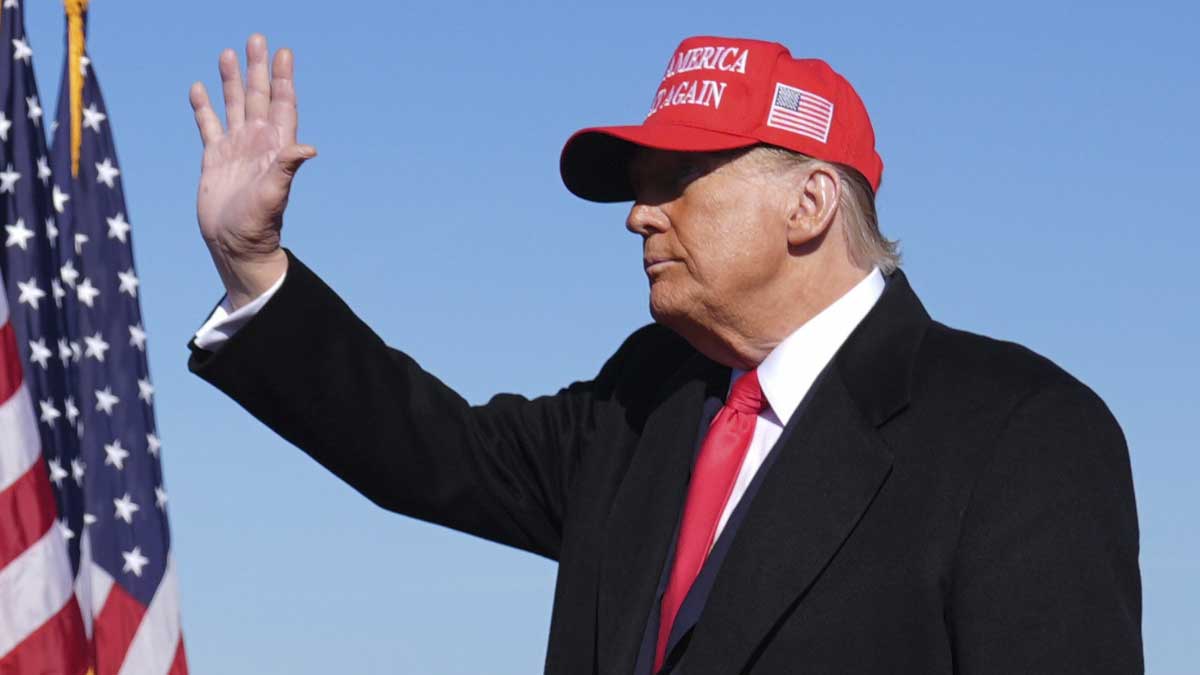- Home
- Billionaires
- Investing Newsletters
- 193CC 1000
- Article Layout 2
- Article Layout 3
- Article Layout 4
- Article Layout 5
- Article Layout 6
- Article Layout 7
- Article Layout 8
- Article Layout 9
- Article Layout 10
- Article Layout 11
- Article Layout 12
- Article Layout 13
- Article Layout 14
- Article Sidebar
- Post Format
- pages
- Archive Layouts
- Post Gallery
- Post Video Background
- Post Review
- Sponsored Post
- Leadership
- Business
- Money
- Small Business
- Innovation
- Shop
Recent Posts
Harris Leads Trump in Iowa, Signaling Trouble

A recent Des Moines Register/Mediacom poll has unveiled a surprising shift in the political landscape of Iowa, revealing that former President Donald Trump has lost his lead to Vice President Kamala Harris. Conducted by renowned pollster J. Ann Selzer, this poll has garnered attention as an outlier among recent surveys but serves as a critical indicator of potential challenges for Trump, particularly given Selzer’s esteemed reputation in polling.
The poll, which surveyed 808 likely voters from October 28 to 31 and was released late Saturday, shows Harris leading Trump by a slim margin of 47% to 44%. This is a notable change from Selzer’s earlier poll in September, where Trump had a four-point advantage, and an even more significant shift from June, when he led Biden by 18 points. The margin of error for this poll is 3.4 points, making Harris’s lead statistically significant.
One of the key factors driving Harris’s surge in Iowa is the support she has garnered from politically independent voters, women, and older voters. The poll indicates that Harris has now overtaken Trump among independents, securing 46% of their votes compared to Trump’s 39%. A remarkable change is observed among independent women, where Harris leads by a substantial 28 points—a significant swing from her previous five-point advantage in September. However, independent men still show a preference for Trump, with a smaller margin of 47% to 37%.
The poll also highlights Harris’s strength among older voters, particularly women aged 65 and over, where she commands 63% support compared to Trump’s 28%. Even among older men, Harris leads narrowly, with 47% to Trump’s 45%. This demographic shift suggests that Harris’s appeal is broadening, potentially positioning her as a serious contender in what has traditionally been a Republican stronghold.
J. Ann Selzer, who has directed the Iowa Poll since 1987 and founded her own firm, Selzer & Co., in the 1990s, is highly regarded in the political polling community. She has earned accolades for her accuracy and is recognized by statistician Nate Silver as one of the top two pollsters in the United States, noted for her transparency and historical accuracy. Her most famous poll predicted that Barack Obama would benefit from a surge of first-time caucusgoers in 2008, which ultimately led to his victory in Iowa.
Despite the poll’s findings, Trump and his allies have expressed skepticism regarding its validity. In an interview with NBC, Trump dismissed the poll as “fake,” claiming it was conducted by a “Trump hater” who oversampled Democrats. Ironically, Trump previously praised Selzer’s polling abilities in 2023 when she forecasted his success in the Iowa caucuses, highlighting the inconsistent narrative surrounding his perceptions of polling credibility.
The poll’s data also reveals a significant decline in support for Trump among men in Iowa. While 52% of men currently back Trump, this marks a 13-point decrease from his previous 59% to 32% lead in September. In contrast, Harris has increased her support among men, indicating a potential shift in voter sentiment.
In contrast to the Selzer poll, an Emerson College/RealClearDefense survey released simultaneously shows Trump maintaining a lead over Harris in Iowa, with 53% to her 43%. This discrepancy illustrates the variability in polling results and emphasizes the importance of considering multiple sources when evaluating electoral dynamics.
Historically, Iowa has been a key battleground for presidential candidates, having voted for Trump in both the 2016 and 2020 elections. Selzer’s previous polls accurately forecasted Trump’s victories in those years, as well as Obama’s wins in 2008 and 2012. With Trump and Harris entering the final stretch before Election Day virtually tied nationally and in several swing states, the implications of this poll could resonate far beyond Iowa.
As the political landscape evolves, recent polling indicates that both candidates are neck-and-neck across various battleground states. The latest New York Times/Siena College survey highlights Harris’s leads in Nevada, North Carolina, Wisconsin, and Georgia, while Trump is favored in Arizona. The two candidates are nearly tied in Pennsylvania and Michigan, underlining the competitive nature of the upcoming election.
The implications of Harris’s newfound lead in Iowa could signal broader trends affecting both candidates as they campaign for voter support. With early voting approaching and the political climate shifting, the dynamics captured in this poll may foreshadow challenges for Trump as he seeks to maintain his foothold in a state that has historically leaned Republican. As independent voters and key demographics realign their support, the race for the presidency could take unexpected turns in the weeks leading up to the election.
In conclusion, while the Selzer poll may stand as an outlier among other recent surveys, its findings warrant serious consideration. The shifts in voter sentiment, particularly among independents and older voters, may reflect changing attitudes that could have significant consequences for both candidates as they head into the final phase of the election campaign.
Recent Posts
Categories
- 193 Countries Consortium Partner1
- 193cc Digital Assets2
- 5G1
- Aerospace & Defense48
- AI37
- Arts3
- Banking & Insurance11
- Big Data3
- Billionaires1,467
- Boats & Planes1
- Business332
- Careers13
- Cars & Bikes79
- CEO Network1
- CFO Network17
- CHRO Network1
- CIO Network1
- Cloud10
- CMO Network18
- Commercial Real Estate7
- Consultant1
- Consumer Tech194
- CxO1
- Cybersecurity73
- Dining1
- Diversity, Equity & Inclusion4
- Education7
- Energy8
- Enterprise Tech29
- Events11
- Fintech1
- Food & Drink2
- Franchises1
- Freelance1
- Future Of Work2
- Games149
- GIG1
- Healthcare79
- Hollywood & Entertainment203
- Houses1
- India’s 1000 Richest1
- Innovation46
- Investing2
- Investing Newsletters4
- Leadership65
- Lifestyle11
- Manufacturing1
- Markets20
- Media327
- Mobile phone1
- Money13
- Personal Finance2
- Policy569
- Real Estate1
- Research6
- Retail1
- Retirement1
- Small Business1
- SportsMoney42
- Style & Beauty1
- Success Income1
- Taxes2
- Travel10
- Uncategorized14
- Vices1
- Watches & Jewelry2
- world's billionaires1,436
- Worlds Richest Self-Made Women2
Related Articles
South Korea Plane Crash: A Tragic Loss and Global Mourning
The tragic plane crash at South Korea’s Muan International Airport on Sunday...
By 193cc Agency CouncilDecember 30, 2024H-1B Visa Debate Splits Trump Allies and Silicon Valley
The debate over H-1B visas has once again become a contentious issue,...
By 193cc Agency CouncilDecember 28, 2024Trump Moves $4B Stake in Truth Social Parent, Stock Drops 6%
Donald Trump recently transferred his 57% stake in Trump Media & Technology...
By 193cc Agency CouncilDecember 20, 2024House Rejects Trump-Backed Funding Bill, Shutdown Looms
The U.S. House of Representatives rejected a new government funding bill on...
By 193cc Agency CouncilDecember 20, 2024















Leave a comment